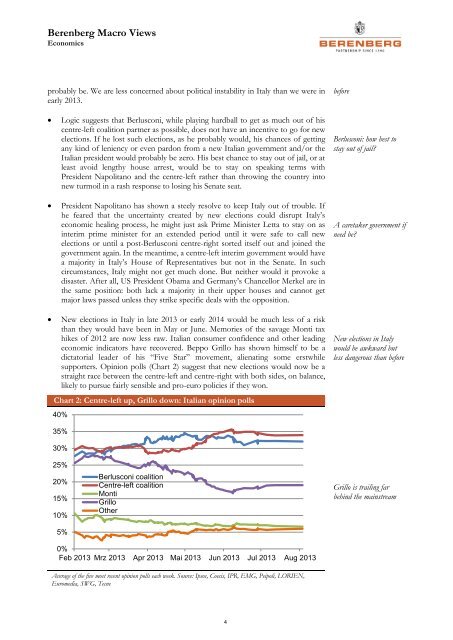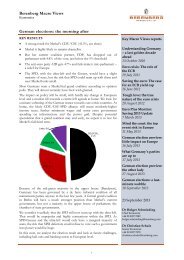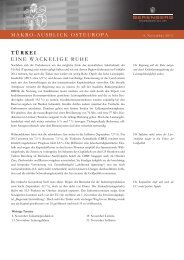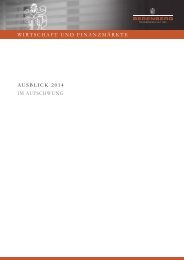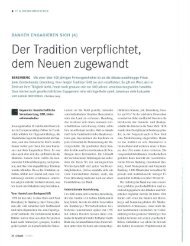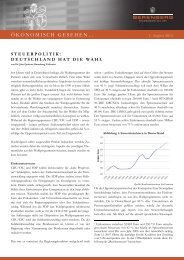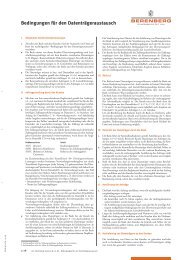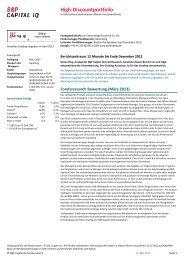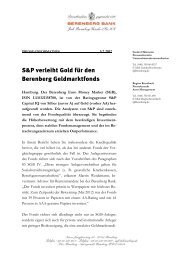full report and disclosures - Berenberg Bank
full report and disclosures - Berenberg Bank
full report and disclosures - Berenberg Bank
Create successful ePaper yourself
Turn your PDF publications into a flip-book with our unique Google optimized e-Paper software.
<strong>Berenberg</strong> Macro Views<br />
Economics<br />
probably be. We are less concerned about political instability in Italy than we were in<br />
early 2013.<br />
before<br />
<br />
<br />
Logic suggests that Berlusconi, while playing hardball to get as much out of his<br />
centre-left coalition partner as possible, does not have an incentive to go for new<br />
elections. If he lost such elections, as he probably would, his chances of getting<br />
any kind of leniency or even pardon from a new Italian government <strong>and</strong>/or the<br />
Italian president would probably be zero. His best chance to stay out of jail, or at<br />
least avoid lengthy house arrest, would be to stay on speaking terms with<br />
President Napolitano <strong>and</strong> the centre-left rather than throwing the country into<br />
new turmoil in a rash response to losing his Senate seat.<br />
President Napolitano has shown a steely resolve to keep Italy out of trouble. If<br />
he feared that the uncertainty created by new elections could disrupt Italy’s<br />
economic healing process, he might just ask Prime Minister Letta to stay on as<br />
interim prime minister for an extended period until it were safe to call new<br />
elections or until a post-Berlusconi centre-right sorted itself out <strong>and</strong> joined the<br />
government again. In the meantime, a centre-left interim government would have<br />
a majority in Italy’s House of Representatives but not in the Senate. In such<br />
circumstances, Italy might not get much done. But neither would it provoke a<br />
disaster. After all, US President Obama <strong>and</strong> Germany’s Chancellor Merkel are in<br />
the same position: both lack a majority in their upper houses <strong>and</strong> cannot get<br />
major laws passed unless they strike specific deals with the opposition.<br />
Berlusconi: how best to<br />
stay out of jail?<br />
A caretaker government if<br />
need be?<br />
<br />
New elections in Italy in late 2013 or early 2014 would be much less of a risk<br />
than they would have been in May or June. Memories of the savage Monti tax<br />
hikes of 2012 are now less raw. Italian consumer confidence <strong>and</strong> other leading<br />
economic indicators have recovered. Beppo Grillo has shown himself to be a<br />
dictatorial leader of his “Five Star” movement, alienating some erstwhile<br />
supporters. Opinion polls (Chart 2) suggest that new elections would now be a<br />
straight race between the centre-left <strong>and</strong> centre-right with both sides, on balance,<br />
likely to pursue fairly sensible <strong>and</strong> pro-euro policies if they won.<br />
Chart 2: Centre-left up, Grillo down: Italian opinion polls<br />
40%<br />
New elections in Italy<br />
would be awkward but<br />
less dangerous than before<br />
35%<br />
30%<br />
25%<br />
20%<br />
15%<br />
10%<br />
5%<br />
Berlusconi coalition<br />
Centre-left coalition<br />
Monti<br />
Grillo<br />
Other<br />
Grillo is trailing far<br />
behind the mainstream<br />
0%<br />
Feb 2013 Mrz 2013 Apr 2013 Mai 2013 Jun 2013 Jul 2013 Aug 2013<br />
Average of the five most recent opinion polls each week. Source: Ipsos, Coesis, IPR, EMG, Peipoli, LORIEN,<br />
Euromedia, SWG, Tecne<br />
4


